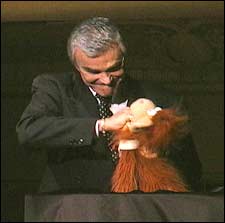Crisis on Faith-2
Adam Barnett's recent "Theological Wednesday" post has spurred me on to post about a topic I've been kicking around in my head for a while now...just how does the afterlife work in the Marvel and DC Universes?
It's been firmly established in both universes that there IS life after death, and that there is a Heaven and Hell...but there's little consistency as to what each place is like, or who gets to go where. As Adam pointed out, in one book Zauriel (who would have some expertise in such matters) states that suicide is an instant ticket to Hell (no matter the circumstances), while another book shows Adrian "Vigilante" Chase doing penance in purgatory, suggesting that it's not as harsh as all that. (And since "Quiver" showed that Oliver Queen made it into Heaven, it's apparent that the DC Universe operates under a very forgiving God.)
One of the goofier metaphysical aspects of the DC Afterlife is the idea (established by Doug Wheeler in Swamp Thing before it went over to Vertigo) that one's afterlife is tied to the physical location of one's death...Wheeler's concept was that Heaven and Hell had developed "pockets" of alien philosophies of the afterlife, due to the influx of alien souls who had died on Earth during the Invasion! crossover. Wheeler's story also showed that Abin Sur had been stranded in Earth's Heaven since his crash, separated from his own people...as I recall, he set off for his own world's Heaven at the end of the story, reasoning that he had all eternity to make the journey. Thankfully, this concept has been ignored since then. (After all, what kind of Paradise is it if you're separated from everyone you knew back home?)
But how do DC's parallel Earths (both pre-Crisis and post-52 versions) jibe with the hereafter? Does each world get a separate afterlife? Did Kal-L go to Heaven-2? Would Earth-3's Heaven and Hell be "reverse" realms where the ruthless are rewarded for their ambition and the innocent are punished for their weakness?
Or is there just one all-encompassing realm containing all the souls of all the worlds (even the ones that were wiped out of existence)? This theory would seem to be supported by the Hawk & Dove Annual where the Icicle, an Earth-2 villain who died before the new Earth was "rebooted," appears in Purgatory alongside several deceased Earth-1 villains before being allowed to move on to Heaven. Of course, that could just be part of the editorial dictate that there was only one world and the Icicle was always part of it.
The Marvel Universe's afterlife seems even more ill-defined...as amusing as the Milligan/Dragotta/Allred Dead Girl mini-series was, I just can't regard it as canon.
One thing's for sure...the residents of these worlds' after-realms have got to have some interesting "Can You Top This?" conversations about how they got there.
Labels: comics


1 Comments:
I've always thought that DC and Marvel approached religion in general very differently -- Marvel seems to ignore in-depth theology and embrace "the basics" of the Abrahamic religions. Oh, sure, there are a few pagan gods and supernatural demons and such running around, and some heroes have always had very clearly defined religious affiliations, such as Kurt Wagner (Catholic) or Kitty Pryde (Jewish). For the most part, though, Marvel seems to skirt around the more delicate issues surrounding religion.
DC, on the other hand, seems to tackle religion face on, but on their own terms. The way the DCU depicts religious is pretty much the way its depicted in the real world, in that there's a mishmosh of religions and variations on religions, and no one can quite seem to agree upon one set of specific parameters -- and that in effect spills over into how DC handles the afterlife. I've always thought of DC's version of the afterlife as somewhat Unitarian Universalist, in that all beliefs are embraced and anything goes, though with an overtone of Abrahamic organization. It's very easy to have blatant Pagans like Wonder Woman running around and rubbing elbows with beings like The Spectre if you assume the DCU has a Universalist setup.
If I remember correctly, DeMatteis once wrote a story that explained that when someone died in the DCU, they were met with the type of afterlife that they pretty much expected -- and received punishment or reward based on what their personal beliefs were in the living world. The afterlife, like the living world, also wasn't static -- it was subject to change, and the position of the deceased was also subject to change).
I have noticed, though, that with the notable exception of Wonder Woman, DC has been very careful to not establish blatant religious affiliations for their main characters (though ever since JSA: Lost, Geoff Johns has been hinting VERY STRONGLY that Hal Jordan is Catholic). That also fits in with a Universalist attitude: one is left with the (probably deliberate) impression that Superman and Batman, for example, would have religious tolerance.
All in all, though, Marvel and DC both seem intentionally vague on the subject of the afterlife, and they probably intend to keep on being vague. :-)
Post a Comment
<< Home